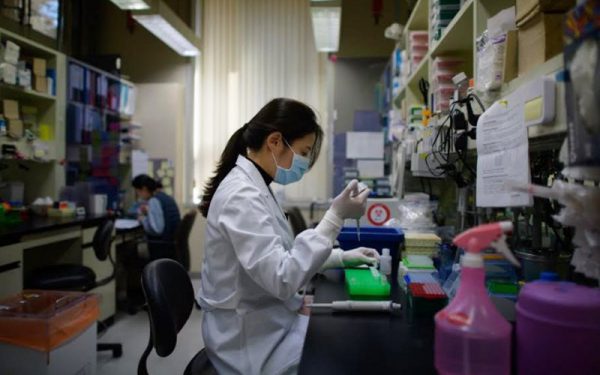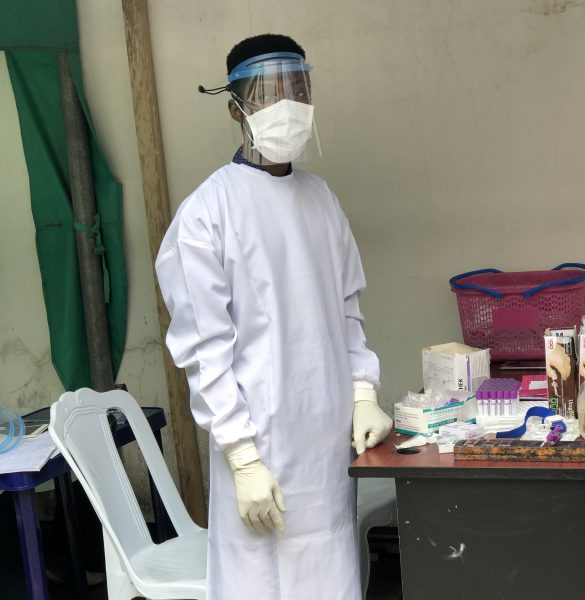COVID-19
As COVID-19 continues to disrupt communities around the world, IVI remains committed to our mission to protect the world’s most vulnerable people from vaccine-preventable diseases by developing safe, effective, and affordable vaccines for global health. We do this for diseases like cholera and typhoid, as well as emerging infectious diseases.

Here’s how we’re accelerating vaccines against COVID-19:
IVI is not pursuing its own COVID-19 vaccine and has chosen to partner with vaccine developers in Korea and globally to accelerate multiple safe and effective vaccines as efficiently as possible. We are conducting early-stage clinical trials, establishing vaccine evaluation systems and developing COVID-19 vaccine adjuvants in addition to epidemiological studies.
Conducting a Phase I/II clinical trial of INOVIO’s COVID-19 DNA vaccine (INO-4800) at two sites in South Korea in collaboration with INOVIO and the Korea National Institute of Health.
- After the first trial participant received the vaccine on July 13, 2020, Part A enrollment was completed with 20 people on September 8, 2020. Follow-up visits for immunogenicity and safety assessment are ongoing. First interim analysis to compare safety profiles and immunogenicity assessment between the two dose groups are planned for December 2020. Read more
- Part B of the clinical trial (Phase IIa) will expand to four clinical trial sites, and the investigator meeting and site initiation visits have been planned.
This study is supported by the Coalition for Epidemic Preparedness Innovations (CEPI).
Establishing vaccine evaluation systems such as ELISA, FRNT (neutralization assay), a pseudovirus neutralization system, and animal infection models to support clinical trials and pre-clinical studies
IVI has been able to provide a range of critical lab support, including:
- Assessment of recombinant VSV vaccine. Immunogenicity testing has been completed and a vaccine candidate selected. Protective efficacy testing using transgenic mouse model is ongoing.
- Assessment of Genexine’s DNA vaccine. Currently assessing neutralizing Ab titers for vaccinated subjects.
- Assessment of bacterial spore-based vaccine candidate from Genofocus. Production of the vaccine has been completed and selecting the optimal immunization dose is ongoing.
- Testing the preventive effects of Celltrion’s therapeutic Ab in transgenic mouse model. The therapeutic efficacy of the Ab with Remdesivir is ongoing.
- Establishing standard sera for COVID-19 as part of an international collaborative. IVI tested international standard candidates in terms of binding antibody titer and neutralizing antibody titer, and transferred the results to the United Kingdom’s National Institute for Biological Standards and Control.
- Establishing standard sera for COVID-19 in partnership with the Korea Disease Control and Prevention Agency. This project aims to establish standard sera to assess Ab titers in clinical trials. To date, IVI has completed two samples for binding antibody titer and neutralizing antibody titer and the KDCA has since provided four additional samples which are undergoing testing.
- Assessment of novel adjuvant (GI-101) with SARS-CoV-2 and influenza antigens. A study looking at the immunogenicity and protective efficacy of an influenza split vaccine with the GI-101 adjuvant has been completed and confirmational experiments are ongoing.
- Evaluating COVID-19 vaccine candidates using different adjuvants including liposomal-based adjuvants developed at IVI. This work is supported by the Finnish government.
- Establishment of Pseudovirus neutralization system. The spike-pseudotyped viruses were generated using VSV platform. Frequently observed amino acid mutations in spike, especially receptor binding domain, will be constructed to test cross-neutralization effect of COVID-19 vaccine candidates.
Conducting epidemiological studies of COVID-19 in Madagascar and Burkina Faso to determine disease burden and support both countries in reporting cases to the global COVID-19 data repository which will ultimately help shape effective policies in responding to the pandemic
- While COVID-19 affects virtually every region of the world, the current understanding of the disease is primarily based on surveillance and epidemiologic investigations from China, Europe, and North and South America. While a lower number of cases are reported from many low- and middle-income countries, improved studies on transmission dynamics across contexts are highly important.
- IVI’s COVIA project will support local institutions in Madagascar and Burkina Faso to detect COVID-19 by putting into place surveillance measures across health care centers. Additional efforts include tracing and testing household contacts of confirmed cases to improve household transmission data. Read more
This study is supported by the Swedish International Development Cooperation Agency.
Supporting clinical trial site preparedness in four African and Asian countries for potential COVID-19 Phase III efficacy vaccine trials
- The Gates Foundation has awarded a preparatory grant for four sites and IVI has identified sites in the Philippines, Nepal, Ghana, and Mozambique for potential future late-stage vaccine clinical trials. Read more
This work is supported by the Bill & Melinda Gates Foundation.

Page last updated in December 2020.
Ask A Vaccine Expert: COVID-19
An ongoing video series featuring IVI scientists answering common questions about COVID-19 vaccines and vaccinations.
COVID-19 in the Media
- CGTN: World’s fastest developed vaccine: A challenging necessity
- Bloomberg: Will the Covid-19 Vaccines Be Effective and Safe?
- Asian Boss: You Need To Listen To This Leading Vaccine Expert From Korea
- CNBC: Europe, North America have a ‘really clear’ need for Covid vaccine, says expert
- Devex: Q&A: Why Jerome Kim is ‘hopeful’ but cautious about distributing a COVID-19 vaccine
- BBC World News: COVID-19 | Jerome Kim: Vaccines are the long-term solution to the pandemic
- The Korea Times: Developing vaccine against COVID-19 (Op-ed)
- South China Morning Post: How long will a coronavirus vaccine take? A Q&A with Jerome Kim, head of the International Vaccine Institute
- NDTV: Top Doctor on Why He Thinks Coronavirus Is Not a ‘Chinese Virus’
- Al Jazeera English: Testing times: Why South Korea’s COVID-19 strategy is working
Page last updated in January 2021
A global pandemic demands responses without borders.
All of our work is made possible by core and project funding from the governments of South Korea, Sweden, India, and Finland; foundations; global health partners; and generous individuals. In unstable times, we’re grateful for these partnerships and proud to do our part in responding to the global health crisis we face today. Join us.


